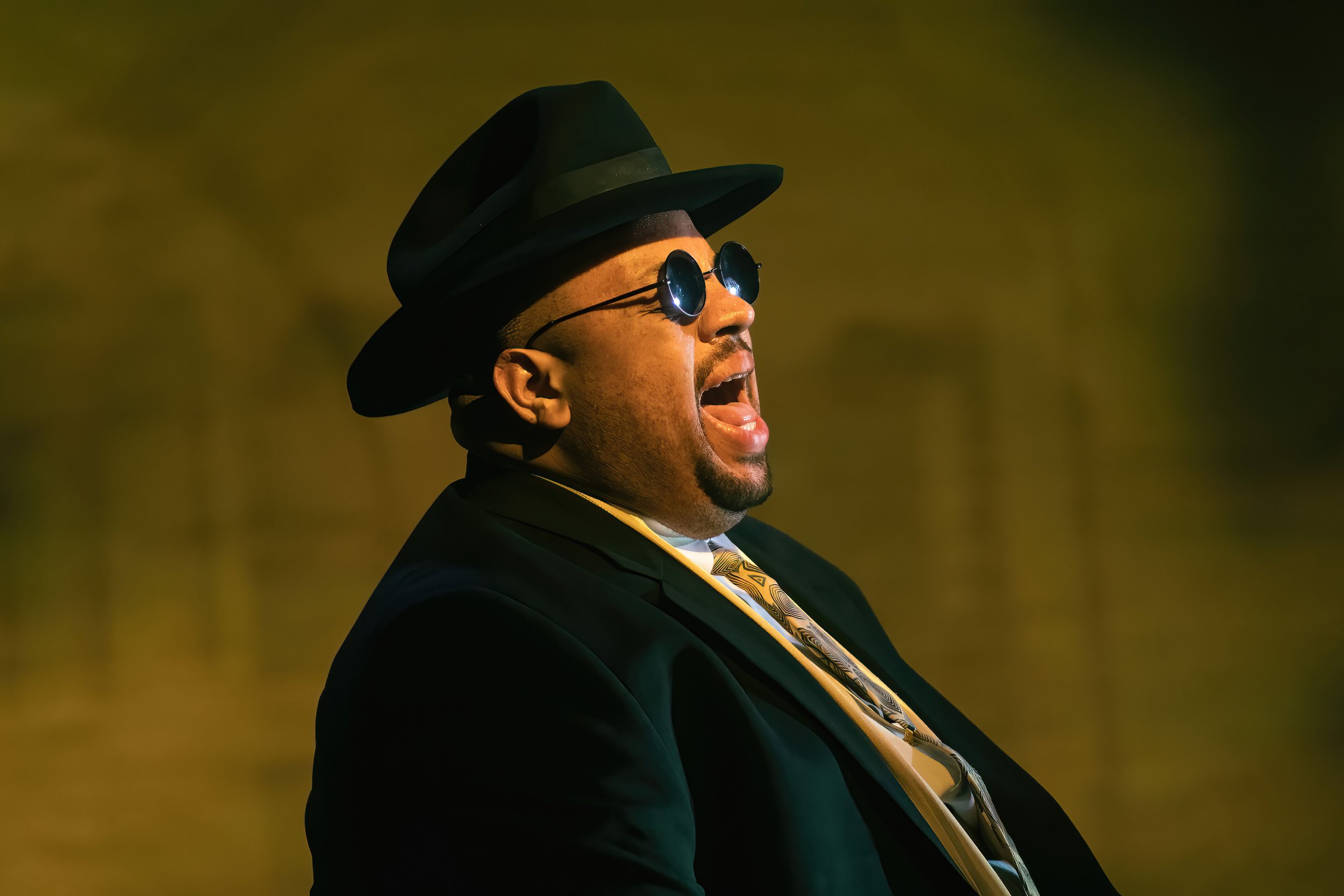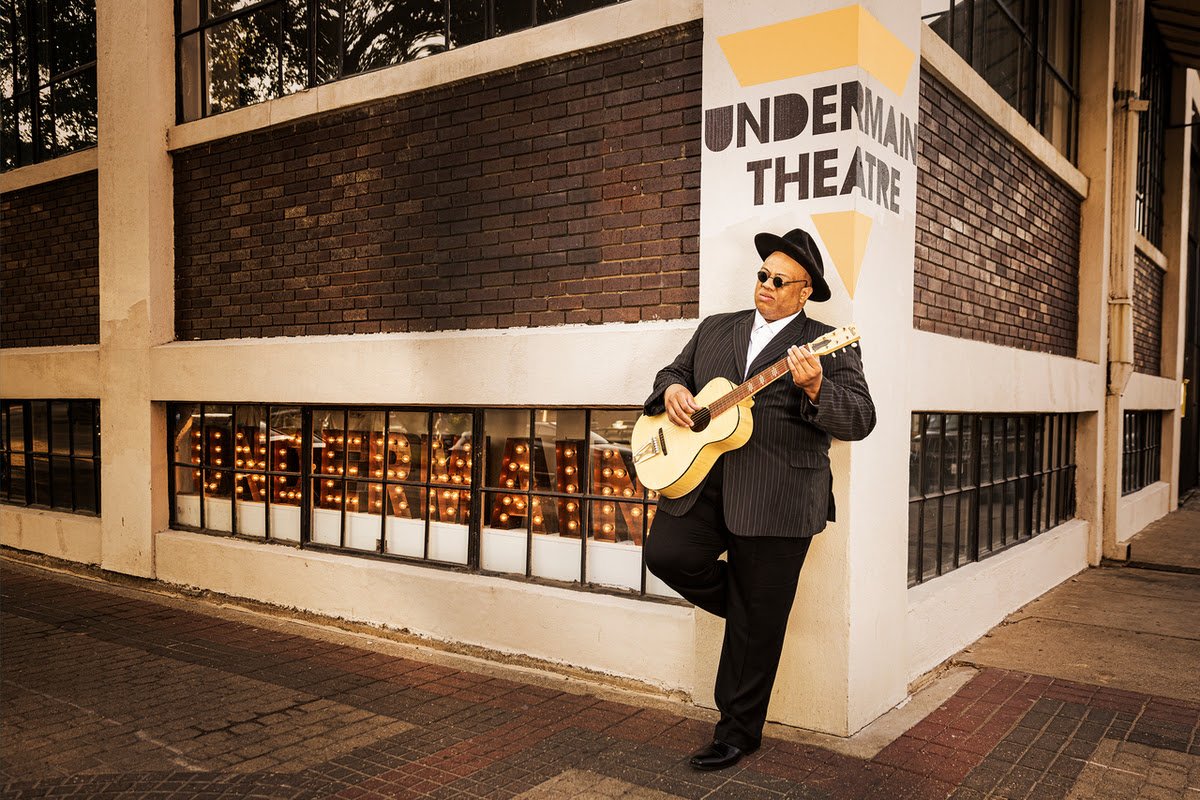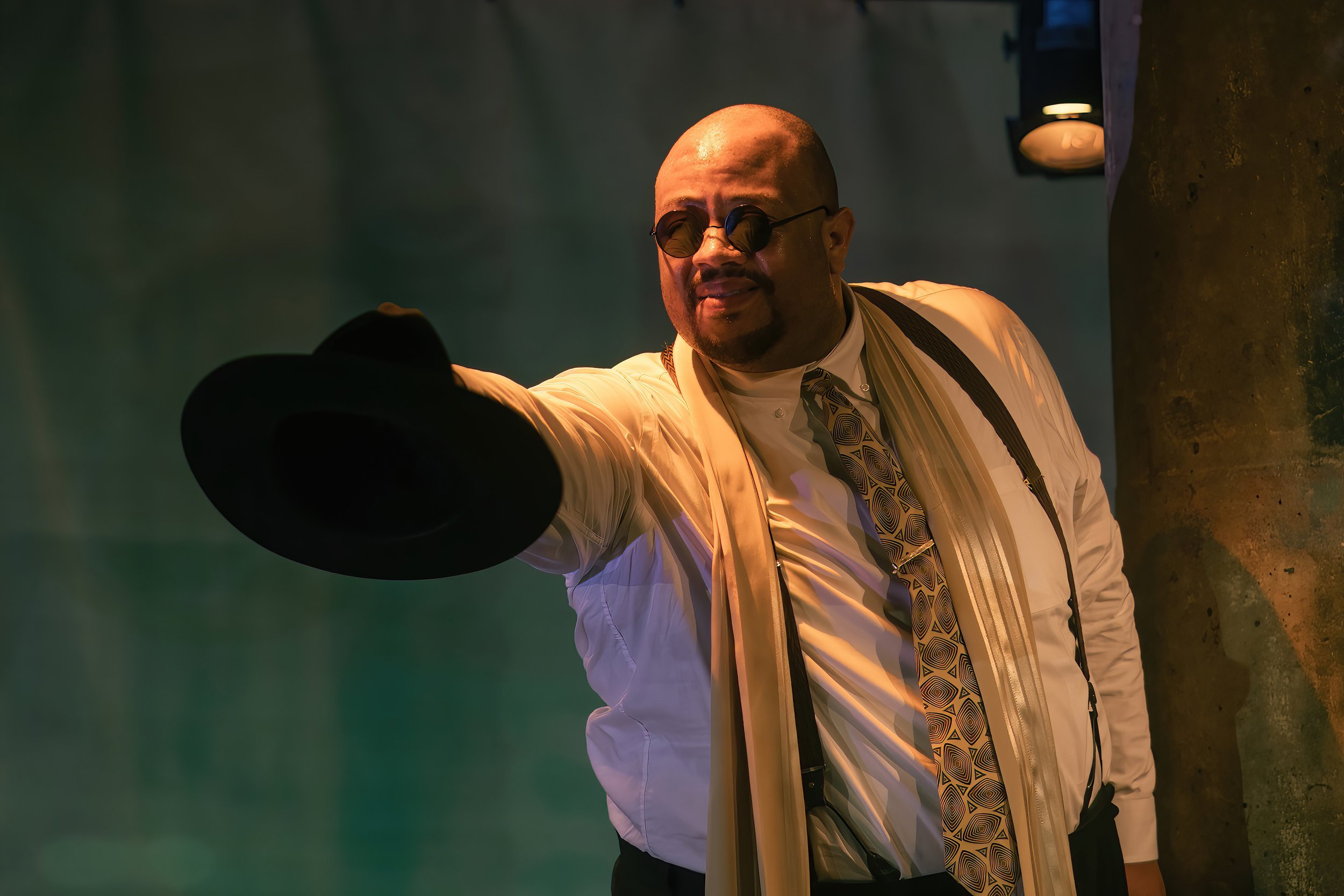Lonesome Blues @ Undermain Theatre
Photo Credits: Evan Michael Woods; Poul Ober
—Martha Heimberg
Fascinating to hear the throbbing, shouting, moaning, whispered songs of Blind Lemon Jefferson at Undermain Theatre in the heart of Deep Ellum, just blocks away from the street corner where the blues legend began his career, singing for tips and making music history.
Lonesome Blues, written by Akin Babatunde and Alan Govenar, and directed in this regional premiere by Babatunde, tells the story of Jefferson’s beginnings in an East Texas town, his teaming up with Lead Belly and other early blues-making greats of the 1920s, and his eventual recognition—which took him to Chicago and the recording of a phenomenal 80 singles records.
The show, which premiered in New York City in 2018 (directed by Undermain’s founding artistic director Katherine Owens and starring Babatunde), is the culmination of their many collaborative efforts to tell Jefferson’s story, including Blind Lemon, Prince of Country Music in 2001, and Blind Lemon Blues, which premiered Off-Broadway in 2007 and had an international tour. So just who is this prince, and what’s his music about? The play’s the thing to tell the tale.
Undermain’s current iteration of the 80-minute one-man show stars J. Dontray Davis, a big man with a big voice. On opening night the sound system failed, so there’d be none of the bluesy guitar accompaniment Blind Lemon invented for his songs. Do we stay or do we go? No problem. Davis valiantly walked into the performance space created by the theater’s huge concrete columns, wearing dark glasses and dressed to the nines. Smiling at the audience in the intimate theater, he tapped out the space with his cane, found the single chair on Robert Winn’s simple set, and took up residence. (Undermain immediately sent an email offering patrons another night to see the show with the sound design. I plan to catch another performance later in the run.)
Talking the talk and singing the songs a cappella, Davis at once captures the artistic brio and personal bravery of Jefferson, who was “born blind from the cradle“ in 1893, and went on to make blues history in his short life. Even without a soundtrack behind him, Davis fills up the space with his resonate voice and brings us swiftly into the world of street corner life. He recalls both his joy in singing songs of his own making, and the physical poverty of living off loose change from passers-by and trade-offs from bar owners who liked the crowds he pulled in.
We learn much of Jefferson’s life from the 30-plus songs in the show. He starts off clapping his knees and singing “Holes in My Clothes” in a rhythmic, longing voice. He’s in a cold Chicago train station in 1929 on what turns out to be the last day of his life. He’s “goin’ home to Texas to see my mama.” He laughs a little and recalls that when he “was singin’ in brothels at night and in church on Sunday,” his mama’s advice about mean gossip came back to him: “When folks stop talkin’ about you, that’s when you worry.” His fans are still talking.
Davis does a good job shifting from memories told in a narrator-style voice to the songs that deliver the root of Jefferson’s music. His voice takes on a soft, soothing quality singing traditional gospel songs like “Steal Away,” and lightens for the upbeat “Deep Ellum Blues.” He literally boogies down to “Blue Jumpin’ Rabbit.” In “Bossman” Davis shouts the overseer’s orders, and then moans softly as he tells of the hard, relentless work of those laboring in thecotton fields.
Davis delivers Jefferson’s famous songs with authority and style. “Black Snake Moan” is a nightmare of a number, one that evokes both terror and sexual longing. His voice drags the theater’s concrete floor in “Mosquito Moan,” as he swats and swears he’s gonna disappear “if I can’t get no mosquito bomb.” I feel those blues.
Singers that Jefferson influenced, and those he loved and learned from, appear in his recollections. Davis’ basso voice turns prissy and preachy when he speaks for his friend Lead Belly, a man “with a belly of lead and a stomach of steel.” He breaks into a rousing “Rock Island Line,” stomping around a column and bragging that the two of them were so good, “they let me and Lead Belly ride for free.” At times on this a cappella night, when Davis had the audience clapping along to his exuberant voice, we forgot there was no other soundtrack but the one he was creating on the spot.
Davis’ Jefferson has a sense of humor, for sure, joking about fighting for his street corner in Deep Ellum, and how even a blind man knows a good-looking woman when he feels one. He has fun playing the ladies, too, singing Bobbie Cadillac’s “Carbolic Acid” in a mincing mezzo style, and drawing the long, fringed scarf around his neck into a boa as he shimmies across the stage. Later, Jefferson brags about how women like more than just his singing, as he struts around and twists the white hankie from his pocket into a pair of panties. Davis sings the love songs in a raw, loving voice.
I got caught up in Jefferson’s great songs, his courage, and his powerful feelings of desire and loneliness. And I know the twangy, country blues guitar accompaniment is gonna make the show even better when I see it again. Meanwhile, you can catch Lonesome Blues in a cool basement space in Deep Ellum, the neighborhood where it all happened a century ago.
WHEN: Through September 18
WHERE: 3200 Main Street, Dallas
WEB: undermain.org


